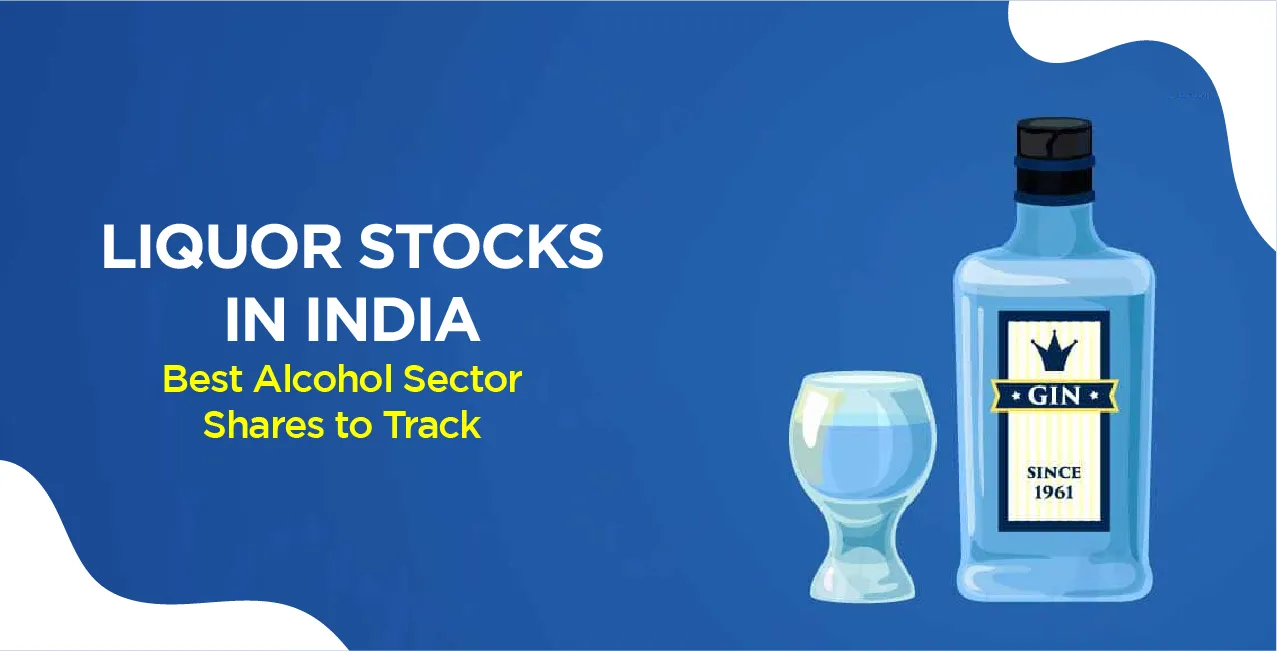Liquor Stocks in India – Best Alcohol Sector Shares to Track

Check Your Loan Eligibility Now
By continuing, you agree to LoansJagat's Credit Report Terms of Use, Terms and Conditions, Privacy Policy, and authorize contact via Call, SMS, Email, or WhatsApp
Liquor stocks in India represent shares of companies engaged in producing and selling alcoholic beverages like beer, wine, and spirits. These stocks offer investors exposure to a robust, though highly regulated, industry shaped by consumer demand, taxation policies, and economic trends.
Take the example of Meera, a 30-year-old investor who entered the liquor stock space in 2022. She researched market trends and invested ₹1,00,000 across three major players: United Spirits, Radico Khaitan, and United Breweries. By early 2024, driven by strong quarterly results and growing urban demand, her portfolio grew to ₹1,65,000, a 65% return in under 2 years.
Company | Amount Invested (₹) | 2024 Value (₹) |
United Spirits Ltd | 40,000 | 64,000 |
Radico Khaitan Ltd | 30,000 | 48,000 |
United Breweries Ltd | 30,000 | 53,000 |
Total | 1,00,000 | 1,65,000 |
Liquor stocks can be profitable, but investors must consider regulatory risks and changing consumer behaviour.
What is Liquor and Why Invest in Liquor Stocks?
Liquor stocks represent shares in companies involved in the production, distribution, or sale of alcoholic beverages like beer, wine, and spirits. Investing in these stocks offers exposure to the liquor industry's performance and profitability, with potential for stable returns and long-term growth.
Why Invest in Liquor Stocks?
The Indian liquor market is influenced by factors such as changing consumer preferences, regulatory changes, and economic conditions. Companies like Radico Khaitan have demonstrated strong performance, driven by premiumisation trends and consistent demand.
Example: Nikhil Kamath's Investment in Radico Khaitan
Nikhil Kamath, co-founder of Zerodha, disclosed on his podcast that he has invested approximately ₹400 crore in Radico Khaitan, acquiring a 1.6–1.7% stake through open market transactions. Radico Khaitan is known for brands like Magic Moments vodka, 8 PM whisky, and Rampur single malt. Kamath mentioned that this investment has performed well for him.
Investment Summary:
Investor | Company | Stake (%) | Investment Amount (₹ Cr) | Market Capitalisation (₹ Cr) |
Nikhil Kamath | Radico Khaitan | 1.6–1.7 | 400 | 22,949 |
If a seasoned billionaire investor like Nikhil Kamath sees value in liquor stocks, it signals strong confidence in the sector. For retail investors, this can be a powerful indicator that the liquor industry holds long-term growth potential and may be worth considering for their portfolios.
Read More - Alcohol Stocks in India
Reasons to Invest in Liquor Stocks in India
Rohan, a 30-year-old software engineer from Hyderabad, had been steadily building his investment portfolio with blue-chip stocks and mutual funds. One day, while reading about emerging sectors, he stumbled upon the growing potential of India's liquor industry. Intrigued, Rohan dug deeper and found several reasons liquor stocks could be a smart addition to his portfolio.
1. Consistent Industry Growth
Rohan learned that, according to CIABC, alcoholic beverage sales in India grew by 7–8% in 2023. Encouraged by this steady growth rate, he realised the liquor sector had the momentum to deliver long-term gains.
2. Rising Revenue and Profitability
Exploring company earnings, Rohan found that top liquor firms reported strong financials. CRISIL data showed that organised liquor players grew revenue by 15% in FY23, fueled by booming tourism and the hospitality industry — a trend that excited him.
3. Huge Market Potential
When Rohan discovered ISWAI’s report predicting the Indian liquor industry would grow from US$ 52.4 billion in 2021 to US$ 64 billion by 2027, he saw the immense market opportunity ahead, driven by urbanisation and rising disposable incomes.
4. Favourable Demographics
India’s young population and shifting social attitudes toward alcohol consumption impressed Rohan. A growing middle class meant consistent demand growth for many years to come.
5. Global and Domestic Interest
Rohan noticed that major international liquor giants were investing heavily in India, further validating the sector's promise and giving him more confidence to consider liquor stocks.
6. Economic Contribution
Understanding that the liquor industry contributed about 2% to India’s GDP and supported over 8 million jobs, Rohan saw how deeply rooted the sector was in India's economy — a sign of its resilience.
7. High Entry Barriers = Limited Competition
Rohan appreciated that strict regulations and advertising bans created natural entry barriers, protecting established companies and supporting strong profit margins, making the sector even more attractive to long-term investors like him.
8. Whiskey Dominance
Finally, Rohan discovered that India consumed more than half of the world’s whiskey, establishing itself as a global demand leader, particularly in premium segments, making whiskey-focused liquor stocks even more appealing.
Key Factors Affecting Liquor Stocks in India
Priya, a 29-year-old finance enthusiast from Pune, recently developed an interest in sector-based investing. While researching promising industries, she noticed how liquor stocks consistently performed well in India despite market fluctuations. To make an informed decision, Priya carefully studied the key factors that could influence the performance of liquor stocks—factors that every investor should be aware of before entering the sector.
Factor | Impact on Liquor Stocks |
Rising Alcohol Consumption | Boosts demand and revenue for liquor companies due to the growing middle class and social acceptance. |
Government Regulations | Changes in taxes, licenses, or state policies can directly affect cost, pricing, and profit margins. |
Market Demand | Shifting consumer preferences toward premium or health-conscious options shape sales strategies. |
Economic Indicators | Inflation and GDP growth influence consumer spending on discretionary items like alcohol. |
Seasonal Variations | Sales spike during festive seasons and weddings, temporarily boosting revenues and stock prices. |
Premiumization Trend | Higher demand for premium brands increases profit margins and brand value. |
Competitive Landscape | Entry of new players and brand competition can impact market share and pricing power. |
Input Costs | Rising prices of grains, glass, and packaging materials can reduce profit margins. |
Distribution & Marketing | Strong distribution networks and digital marketing drive sales and market presence. |
Financial Health & Positioning | A company’s balance sheet strength and brand value influence investor confidence and stock performance. |
Best Liquor Stocks in India
Note: The data below is taken from Google's finances
Stock Name | Market Cap | P/E ratio | Dividend Yield(%) | 1-year return (%) |
Ravi Kumar Distilleries Ltd | 672.48M INR | 49.99 | - | 25.65 |
Piccadilly Sugar And Allied Industr(NDA) | 1.30B INR | - | - | 5.70 |
India Glycols Ltd | 42.32B INR | 20.24 | 0.59 | 67.05 |
Tilaknagar Industries Ltd | 47.03B INR | 25.74 | 0.21 | 8.91 |
Allied Blenders and Distillers Ltd | 85.31B INR | - | - | -4.06 |
Radico Khaitan Ltd | 323.13B INR | 105.18 | 0.12 | 40.04 |
United Breweries Ltd | 552.50B INR | 129.96 | 0.48 | 13.05 |
United Spirits Ltd | 1.09T INR | - | - | 14.85 |
Globus Spirits Ltd | 30.11B INR | 175.11 | 0.34 | 34.37 |
Factors to Consider Before Investing in Liquor Stocks in India
Also Read - Best Long-Term Stocks to Invest
Before investing in liquor stocks, it’s essential to analyse not just company performance but also broader industry dynamics, government policies, and market risks. Here's an elaboration of key factors, along with real-world-inspired examples to illustrate their importance:
1. Company Fundamentals
- Financial Health
Always check revenue trends, profitability, debt levels, and cash flow. A strong balance sheet indicates stability and long-term potential.
- Example: Rohan, a retail investor from Mumbai, invested ₹50,000 in a small liquor company that looked promising. However, the company had a weak financial structure and rising debt. Within a year, poor quarterly results and liquidity issues led to a 35% drop in the stock. He now prioritises companies with solid financials.
- Brand Reputation
Strong liquor brands often enjoy loyal customer bases and better pricing power. Brand recognition plays a vital role in consumer decisions.
- Example: Sneha invested in United Breweries Ltd because of its strong branding and long-standing reputation. Even during market corrections, the stock remained resilient. Her investment yielded 18% returns over two years with minimal volatility.
- Market Demand
Understanding consumer trends—like the rising preference for premium or health-conscious drinks—can guide better investment choices.
- Example: Aarav noticed the growing popularity of premium spirits among millennials. He invested ₹1 lakh in Radico Khaitan, known for premium offerings like Rampur Indian Single Malt. Within 18 months, his investment grew by 40% as premium segments outperformed others.
2. Regulatory and Industry-Specific Factors
- Regulatory Environment
The liquor industry is subject to complex state-level laws, taxes, and distribution rules, which can vary significantly across regions.
- Example: Meena bought shares in a regional liquor company, unaware of an upcoming state excise tax increase. After the policy was implemented, profits declined sharply due to uncompetitive pricing, leading to a 20% drop in the stock. Now she always checks regulatory risks before investing.
- Market Competition
The liquor industry in India is highly competitive, with domestic giants and global brands constantly vying for market share.
- Example: Dev invested in a mid-sized liquor company without analysing the competitive landscape. As international brands expanded into India, the company lost ground, and its revenue fell. The stock underperformed while competitors surged.
- Economic Fluctuations
While liquor is considered somewhat recession-resistant, economic downturns can still reduce discretionary spending and affect margins.
- Example: During the 2020 pandemic, Priya’s investment in United Spirits dropped temporarily. But thanks to strong fundamentals and steady demand recovery, the stock bounced back in 2021, giving her long-term confidence in the sector.
Risks and Challenges in Liquor Stocks
Amit, a 34-year-old marketing professional from Delhi, was excited about investing in India's growing liquor sector. However, after a few months of tracking the market, he realised that liquor stocks, while promising, also came with their own set of risks. Wanting to invest wisely, Amit listed the key risks that could impact the performance of liquor stocks and decided to factor them into his investment decisions.
Here’s the breakdown Amit created:
Risk | Impact on Liquor Stocks |
Regulatory Hurdles | Strict and varying laws across regions can increase operational costs and delay expansion. |
Cultural Sensitivities | Negative social perceptions in some regions can limit market potential and sales volume. |
Tariffs and Trade Barriers | Higher import/export costs due to tariffs can hurt profit margins and disrupt supply chains. |
Competition from Local Brands | Local players with better pricing and market insight can reduce the market share of big brands. |
Health and Social Concerns | Public health campaigns and growing awareness of alcohol-related issues can reduce demand. |
Marketing Restrictions | Ban on alcohol advertising in India forces brands to use indirect marketing, limiting visibility. |
Price Sensitivity | Liquor, being a discretionary item, is impacted by economic downturns and inflation. |
Raw Material Price Volatility | Fluctuating prices of grains, glass, and packaging materials can increase production costs. |
Legal and Compliance Risks | Non-compliance with licensing or local policies can lead to fines or shutdowns. |
Political and Geopolitical Risk | Policy changes or tensions between countries can affect import/export and overall stability. |
Future Of Liquor Stocks In India
India's liquor industry is on a strong growth path, projected to expand at a CAGR of 5.8% from 2025 to 2034. Driven by rising incomes, urban lifestyles, changing consumer behaviour, and innovation, liquor stocks are becoming an increasingly attractive investment avenue.
Key Growth Drivers (with Real-Life Inspired Examples)
1. Rising Disposable Incomes
India’s per capita income is projected to increase from ₹1,96,000 lakh in 2023 to over ₹3,00,000 by 2030. As people have more money to spend, demand for premium alcohol is increasing.
Example: In 2022, Anjali, a 35-year-old software developer in Bengaluru, noticed her peers shifting to higher-end liquor brands. She invested ₹2,00,000 in Radico Khaitan and United Spirits. By 2024, her portfolio had grown to ₹2,85,000, gaining 42.5% in two years.
2. Urbanisation and Changing Lifestyles
With growing urbanisation, more Indians are engaging in social events where alcohol consumption is common.
Example: Rohit, a marketing executive in Mumbai, observed rising sales in urban bars and lounges. Based on this, he invested ₹1,50,000 in United Breweries in 2021. In three years, his investment returned over 38%, boosted by urban demand.
3. Evolving Consumer Preferences
Younger consumers are opting for premium, branded, and even healthier alcohol choices.
Example: Sneha, a 28-year-old entrepreneur, saw the increasing popularity of premium gin and flavoured vodka. She allocated ₹1,00,000 to craft liquor companies, including niche players like Globus Spirits. Her bet paid off with a 35% return in under 18 months.
4. Innovation and Product Diversification
Liquor brands are launching craft spirits, flavoured options, and even non-alcoholic variants to tap into new markets.
Example: Nikhil, an investor in Delhi, was impressed by a company’s introduction of low-alcohol wines targeted at health-conscious consumers. He invested ₹80,000 in 2022, which turned into ₹1,10,000 by 2024, delivering a 37.5% return.
5. Digital Transformation
Online liquor delivery and digital campaigns have increased product visibility and customer engagement.
Example: Priya, a digital marketer, tracked how liquor brands were scaling through Instagram promotions and online sales. She bought shares of a listed liquor tech startup in 2023 for ₹1,00,000. Within a year, her investment grew to ₹1,32,000 (32% gain) as the brand expanded digitally.
Who Should Invest In Liquor Stocks?
Investor Type | What They Look For | Why Liquor Stocks Fit | Example |
Long-Term Investors | Steady growth over the years | Liquor consumption trends in India are rising steadily | Rajesh, a corporate employee, invested in United Spirits (2018), saw a 60 %+ return in 5 years |
Income Seekers | Regular dividends or passive income | Many liquor companies pay consistent dividends | Meena, a retired teacher, earns a 1.5%–2% dividend yield from Radico Khaitan |
Moderate to High-Risk Investors | Willingness to tolerate market and policy volatility | A sector can be impacted by taxes/regulations, but also offers high upside | Arjun invested in a small-cap liquor stock post-COVID and earned a 45% gain in 18 months |
Diversification Seekers | Exposure to unique consumer-driven sectors | Liquor stocks behave differently from tech, finance, or FMCG | Sneha added liquor stocks to her portfolio, for the portfolio's performance stayed strong during market dips |
Brand-Focused Investors | Preference for trusted, premium brands | Liquor brands with a strong identity hold pricing power and customer loyalty | Ananya chose United Breweries for its Kingfisher brand value, stock held firm even in volatile markets |
How To Invest In Liquor Stocks?
Choose a Broker:
Start by selecting a trusted brokerage platform. Popular options include Zerodha, Groww, Upstox, or Angel One. These platforms offer seamless access to Indian stock markets and provide various tools to help you with your investments.
Account Opening:
To begin your investment journey, you need to open a Demat and Trading account. Here's how to do it:
- Visit Broker’s Website/App: Open the account via the platform’s website or mobile app.
- Provide Personal Details: Enter your personal information, such as your name, PAN, Aadhaar, and bank account details.
- Complete KYC: Complete your Know Your Customer (KYC) verification. This can be done via Aadhaar-based e-KYC or a video selfie.
- E-Sign the Application: After verification, you’ll need to e-sign the form using an OTP sent to your Aadhaar-linked mobile number.
Link Bank Account:
Once your Demat and Trading accounts are active, link your bank account to your trading account. This allows for easy deposits and withdrawals, enabling smooth transactions when buying or selling liquor stocks.
Research Liquor Stocks:
Before making any investment, it’s important to research companies involved in the liquor sector. Some popular liquor stocks in India include:
- United Spirits Ltd: A leading player in the premium and mainstream alcoholic beverages market.
- Radico Khaitan Ltd: Known for its popular brands like Rampur Indian Single Malt and 8 PM Whisky.
- Shaw Wallace: Focuses on premium liquor brands with strong domestic and international sales.
- Tilaknagar Industries: Known for manufacturing popular spirits brands like Mansion House.
For instance, United Spirits has been expanding its product range and strengthening its market position, making it a top contender for liquor stocks investment.
Place Your Order:
- Log In: Access your trading account through the broker’s app or website.
- Search Stocks: Use the search function to find the liquor stock you're interested in, like United Spirits or Radico Khaitan.
- Buy Order: Enter the number of shares you wish to purchase and set your preferred buying price. You can also place a market order if you're okay with buying at the current price.
- Confirm: Review the order details and confirm your transaction to finalise your investment.
Monitor Your Investment:
- Track Performance: Use the broker’s platform to regularly track the performance of your liquor stocks.
- Stay Informed: Keep up with industry trends, government policies related to alcohol taxation, and any changes in alcohol consumption patterns that could impact the liquor industry.
Final Thoughts: Should You Invest in Liquor Stocks?
Investing in liquor stocks in India can be a promising opportunity for long-term growth, given the sector's strong fundamentals, consistent demand, and demographic tailwinds. With rising alcohol consumption, especially among the growing middle class, and a favourable economic environment, leading liquor companies are well-positioned for profitability. Additionally, the increasing trend of premiumisation and the sector's contribution to GDP further enhances its investment appeal.
However, it’s crucial to be aware of regulatory risks, cultural sensitivities, and competition within the market. If you’re looking for a sector with steady growth potential and the ability to weather economic fluctuations, liquor stocks can be a worthwhile addition to your portfolio. But like any investment, due diligence and careful risk assessment are key to making informed decisions.
Other Stocks List | ||
About the author

LoansJagat Team
Contributor‘Simplify Finance for Everyone.’ This is the common goal of our team, as we try to explain any topic with relatable examples. From personal to business finance, managing EMIs to becoming debt-free, we do extensive research on each and every parameter, so you don’t have to. Scroll up and have a look at what 15+ years of experience in the BFSI sector looks like.
Subscribe Now
Related Blog Post
Recent Blogs
All Topics
Contents
Quick Apply Loan
Consolidate your debts into one easy EMI.
Takes less than 2 minutes. No paperwork.
10 Lakhs+
Trusted Customers
2000 Cr+
Loans Disbursed
4.7/5
Google Reviews
20+
Banks & NBFCs Offers
Other services mentioned in this article



.png)




